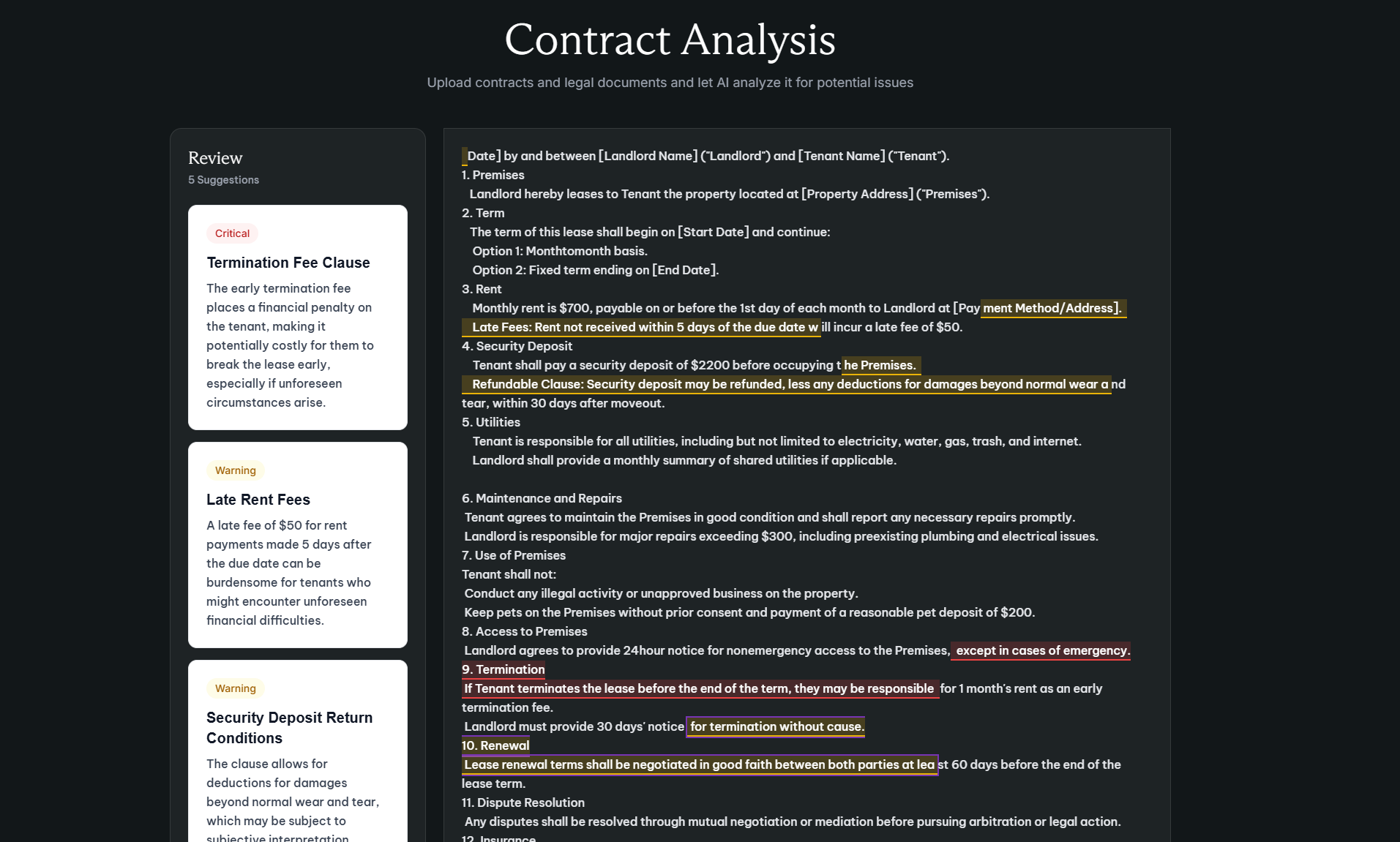Kontra
Published Dec 16, 2024
⋅
Web App
⋅
Active
⋅
2 views
AI-powered contract analysis tool

Quick Links
Tech Stack
Typescript, Nextjs, Tailwind CSS, Supabase, Documind
Key Features
- Risky Clause Detection: Identifies clauses in contracts that may pose risks or need careful consideration.
- Negotiation Opportunities: Highlights areas where you can negotiate better terms.
- Unfair Agreements Detection: Detects unfair terms that you shouldn't agree to.
Featured Snippets
Analyzing Contracts
Kontra takes in the uploaded file or pasted text to PDF and then analyzes it by extracting the specific clause, the level of risk and the suggsetion or details of what should be taken note of/avoided.
Here’s how it works:
- Converts to PDF : It converts the uploaded file or pasted text to PDF format.
- Uploads the PDF on Supabase: It uploads the document to Supabase storage and returns the signed url.
- Analyzes and extracts structured data: It passes the URL to Documind to analyze the contract and then extract structured data.
- Outputs the analysis - It returns the analysis of ach clause, their risk level and highlights their position on the document.
import { NextResponse } from "next/server";
import { extract, formatter } from "documind";
import { v4 as uuidv4 } from "uuid";
interface Issue {
id: string;
type: string;
title: string;
description: string;
}
interface Section {
id: string;
type: string;
range: [number, number];
}
export const dynamic = "force-dynamic";
export const POST = async (req: Request) => {
try {
const body = await req.json();
const fileUrl = body.fileUrl;
if (!fileUrl) {
return NextResponse.json({ error: "File URL is required" }, { status: 400 });
}
// Analyze the contract
const analyzedText = await extract({
file: fileUrl,
schema: [
{
"name": "contractSuggestions",
"type": "array",
"description": "An array of clause suggestions extracted from the contract document.",
"children": [
{
"name": "type",
"type": "string",
"description": "This field indicates the level of attention the clause requires. high suggests critical examination, medium is a caution, and low might offer a beneficial negotiation point or a general advantage."
},
{
"name": "title",
"type": "string",
"description": "A concise label for easy identification of the clause and its implications."
},
{
"name": "description",
"type": "string",
"description": "This field is for the contextual reasoning for the assigned type, detailing potential risks, disadvantages, or advantages and what should be done or avoided."
},
{
"name": "exactClause",
"type": "string",
"description": "This field is for the exact text of the clause, ensuring fidelity to the source document and accuracy in evaluation."
}
]
}
],
});
const suggestions = analyzedText?.data?.contractSuggestions || [];
if (!Array.isArray(suggestions) || suggestions.length === 0) {
return NextResponse.json({ error: "No contract suggestions found." }, { status: 400 });
}
// Extract plaintext from the file
const extractedText = await formatter.plaintext({ file: fileUrl });
// Initialize result with explicit types
const result: { issues: Issue[]; sections: Section[] } = {
issues: [],
sections: [],
};
for (const suggestion of suggestions) {
const id = uuidv4(); // Generate a unique ID
const type = suggestion.type.toLowerCase();
// Add to issues array
result.issues.push({
id,
type,
title: suggestion.title,
description: suggestion.description,
});
// Find the range for `exactClause`
const start = extractedText.indexOf(suggestion.exactClause);
const end = start + suggestion.exactClause.length;
if (start === -1 || end === -1) {
console.warn(`Could not find exactClause in extracted text: ${suggestion.exactClause}`);
}
// Add to sections array
result.sections.push({
id,
type,
range: [start, end],
});
}
return NextResponse.json({ result });
} catch (error) {
console.error("Error in API route:", error);
return NextResponse.json(
{ error: error || "An unknown error occurred" },
{ status: 500 }
);
}
};